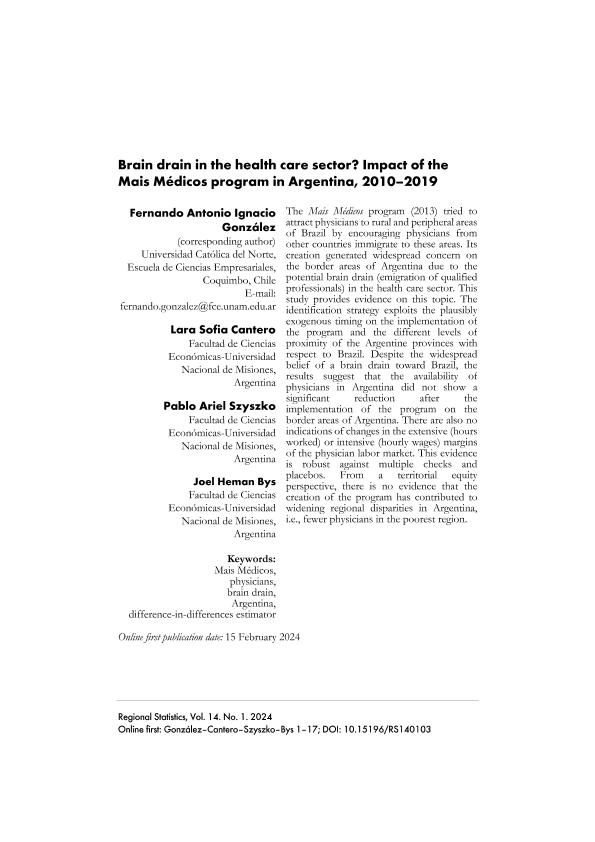Mostrar el registro sencillo del ítem
dc.contributor.author
González, Fernando Antonio Ignacio

dc.contributor.author
Cantero, Lara Sofia
dc.contributor.author
Szyszko, Pablo Ariel
dc.contributor.author
Bys, Joel Heman
dc.date.available
2024-04-03T13:41:15Z
dc.date.issued
2024-02
dc.identifier.citation
González, Fernando Antonio Ignacio; Cantero, Lara Sofia; Szyszko, Pablo Ariel; Bys, Joel Heman; Brain drain in the health care sector? Impact of the Mais Médicos program in Argentina, 2010–2019; Hungarian Central Statistical Office; Regional Statistics; 14; 1; 2-2024; 1-17
dc.identifier.uri
http://hdl.handle.net/11336/231780
dc.description.abstract
The Mais Médicos program (2013) tried to attract physicians to rural and peripheral areas of Brazil by encouraging physicians from other countries immigrate to these areas. Its creation generated widespread concern on the border areas of Argentina due to the potential brain drain (emigration of qualified professionals) in the health care sector. This study provides evidence on this topic. The identification strategy exploits the plausibly exogenous timing on the implementation of the program and the different levels of proximity of the Argentine provinces with respect to Brazil. Despite the widespread belief of a brain drain toward Brazil, the results suggest that the availability of physicians in Argentina did not show a significant reduction after the implementation of the program on the border areas of Argentina. There are also no indications of changes in the extensive (hours worked) or intensive (hourly wages) margins of the physician labor market. This evidence is robust against multiple checks and placebos. From a territorial equity perspective, there is no evidence that the creation of the program has contributed to widening regional disparities in Argentina, i.e., fewer physicians in the poorest region.
dc.format
application/pdf
dc.language.iso
eng
dc.publisher
Hungarian Central Statistical Office
dc.rights
info:eu-repo/semantics/openAccess
dc.rights.uri
https://creativecommons.org/licenses/by-nc-sa/2.5/ar/
dc.subject
MAIS MEDICOS
dc.subject
PHYSICIANS
dc.subject
BRAIN DRAIN
dc.subject
ARGENTINA
dc.subject
DIFFERENCE-IN-DIFFERENCES ESTIMATOR
dc.subject.classification
Economía, Econometría

dc.subject.classification
Economía y Negocios

dc.subject.classification
CIENCIAS SOCIALES

dc.title
Brain drain in the health care sector? Impact of the Mais Médicos program in Argentina, 2010–2019
dc.type
info:eu-repo/semantics/article
dc.type
info:ar-repo/semantics/artículo
dc.type
info:eu-repo/semantics/publishedVersion
dc.date.updated
2024-03-19T14:20:23Z
dc.identifier.eissn
2064-8243
dc.journal.volume
14
dc.journal.number
1
dc.journal.pagination
1-17
dc.journal.pais
Hungría

dc.journal.ciudad
Budapest
dc.description.fil
Fil: González, Fernando Antonio Ignacio. Consejo Nacional de Investigaciones Científicas y Técnicas. Centro Científico Tecnológico Conicet - Nordeste; Argentina. Universidad Nacional de Misiones; Argentina. Universidad Católica del Norte; Chile
dc.description.fil
Fil: Cantero, Lara Sofia. Universidad Nacional de Misiones. Facultad de Ciencias Económicas; Argentina
dc.description.fil
Fil: Szyszko, Pablo Ariel. Universidad Nacional de Misiones. Facultad de Ciencias Económicas; Argentina
dc.description.fil
Fil: Bys, Joel Heman. Universidad Nacional de Misiones. Facultad de Ciencias Económicas; Argentina
dc.journal.title
Regional Statistics
dc.relation.alternativeid
info:eu-repo/semantics/altIdentifier/url/https://www.ksh.hu/docs/hun/xftp/terstat/online-first/rs140103.pdf
dc.relation.alternativeid
info:eu-repo/semantics/altIdentifier/doi/http://dx.doi.org/ 10.15196/RS140103
Archivos asociados
